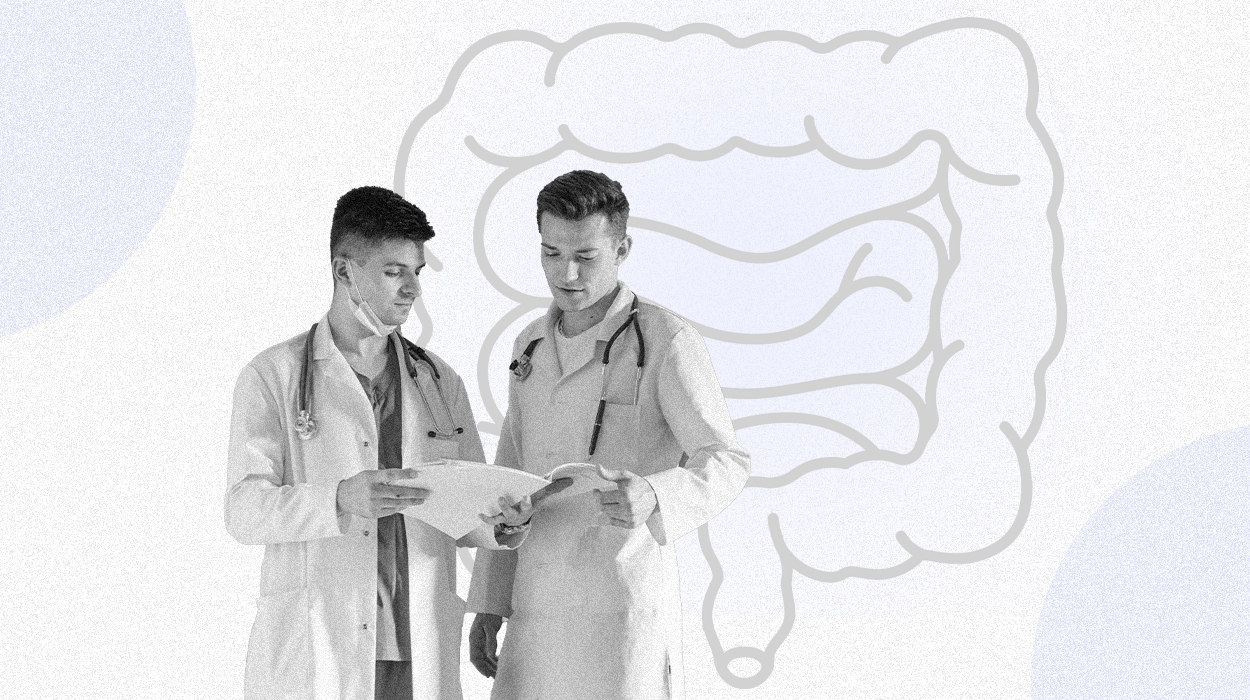 Evidence Based
Evidence Based
Evidence Based
This article is objectively based on relevant scientific literature, written by experienced medical writers, and fact-checked by a team of degreed medical experts.
Our team of registered dietitian nutritionists and licensed medical professionals seek to remain objective and unbiased while preserving the integrity of any scientific debate.
The articles contain evidence-based references from approved scientific sites. The numbers* in parentheses (*1,2,3) will take you to clickable links to our reputable sources.
How To Clean Out Bowels Quickly: The Research In 2024

If you are struggling with your digestive health, you may wonder how to quickly clean out your bowels. One way to quickly clean your bowels is by doing a colon cleansing. A colon cleanse is only medically necessary when you are preparing for a colonoscopy.
Suppose you are interested in a more long-term way to improve your digestive health. In that case, you may want to consider dietary and behavioral changes to help get your bowels moving. For example, consuming more fiber and probiotics may offer a natural colon cleanse. These typically take a bit longer than a colon cleanse but are more likely to help you long-term.
How To Clean Out Bowels Quickly At Home
- Colon irrigation procedure
- Enema
- Diet and exercise
- Laxatives
- Herbal medicines
- Probiotics
- Enzymes supplementation
- Natural cleansing beverages
How To Clean Out Bowels Quickly
Featured Partner

Low-Calorie
Non-GMO
Vegan-friendly
Get Blown Away By Expert-Crafted Formula
Learn More About Colon Broom – one of the quality supplements promoting regular bowel movements, alleviates bloating, and supports healthy cholesterol levels.
Colonic Irrigation Procedure
Most of the research on colon cleansing is based on medical procedures called colonics, not at-home procedures. This is because colon cleansing is not typically necessary unless you are experiencing severe or chronic constipation or are about to undergo a colonoscopy. So how to clean out bowels quickly?
If you wonder what comes out during a colon cleansing, the answer is exactly what you expect. When a colon cleansing is performed, all the fecal matter in the digestive tract is flushed out through a colonic procedure, which may also be referred to as colonic hydrotherapy or colonic irrigation.
During this procedure, the colon is irrigated with water to prepare for a colonoscopy. Typically patients are asked to eat a special diet and take laxatives before colonic irrigation. It is not safe to perform a colon cleanse at home.
Enema
A somewhat similar at-home procedure is called an enema. Enema kits are sold over the counter at drugstores and are typically used to relieve constipation. The water (or saltwater) used in an enema does not reach as far up in the colon as the water in a colon irrigation procedure. This is why enemas are advertised as at-home procedures.
That being said, enemas can still result in severe complications, and you should consult a medical professional before deciding to self-administer one. There are many safer options that you can try before you resort to using an enema kit, such as increased hydration and a high-fiber diet.
Diet And Exercise
First, assess your diet and exercise regime. Fiber and fluid intake[1] are important factors for your gut health. Low-fiber[2] diets and dehydration can both increase the risk of becoming constipated. Some research indicates that warm water[3] specifically may help speed up bowel movement.
Increasing your fiber is recommended because the typical North American diet does not include sufficient fiber.[4] North Americans consume about 17 grams of fiber daily, but the recommended amount is 25-38 grams.[5] Focus on eating fiber-rich foods like whole grains, fruits, and vegetables. In conjunction with a high-fiber diet, ensure you are adequately hydrated by drinking 91-125 ounces of water[6] daily (11.5-15.5 cups).
Regular exercise[1] can also improve digestive health and instigate a bowel movement when you are constipated.
Laxatives
The use of laxatives[1] is another common at-home treatment for constipation. Laxatives are sold over the counter as pills, chewable tablets, liquids, and powders. It can also be found in suppository form. Laxatives are generally considered safe[7] when the appropriate dosing is followed.
Herbal Medicine
MaZiRenWan, also known as the Hemp Seed Pill, is a traditional Chinese Herbal Medicine[8] used to treat constipation in a complementary and integrative health approach. Research indicates that treatment with the Hemp Seed Pill was as effective as a common laxative called Senna in regards to relieving constipation. Herbal teas are a popular way to treat[9] constipation.
Probiotics
A 2014 review indicated that taking probiotic supplements or eating probiotic-rich foods may not only assist digestive health; it may increase[10] stool frequency, improve stool consistency, and regulate the amount of time it takes for food to travel through the digestive tract. However, these researchers also warn that much of the data reviewed was self-reported and could be biased.
A more recent study from 2020 also indicates that probiotics may be helpful for gut health, but the research could be biased.[11] It is difficult to determine if probiotics help heal the gut because there are many different probiotic strains. Each strain could have different benefits. Even though more randomized control studies are being conducted, many still need to be done.
In the end, eating probiotic foods is very low risk, so it may be worth trying even though the research is unclear. Fermented foods are a food source of probiotics.
Enzyme Supplementation
Supplementing your diet with digestive enzymes may help relieve your constipation. This is especially true for people with digestive disorders[12] such as lactose intolerance. Discuss supplementing with digestive enzymes with your doctor or registered dietitian to ensure you take the correct enzyme.
Natural Cleansing Beverages
Some companies or individuals share recipes for cleansing beverages that contain ingredients like apple cider vinegar, lemon juice, cayenne, cumin, and raw garlic. These natural remedies are purported to reduce bad gut bacteria and increase helpful bacteria.[13] However, there is limited research on these claims.
Benefits Of Cleaning Out Bowels
For most people, there are no benefits to cleaning out the bowels. One way to know if you will benefit from a bowel cleanse is to monitor your gut health by tracking the frequency and consistency of your bowel movements. If your digestive system is healthy and you have comfortable and regular bowel movements, you shouldn’t need to clean your bowels.
Some people believe that cleaning out your bowels or doing a colon cleanse will help eliminate toxins from your body. However, no substantial scientific evidence supports these claims, and doctors warn that the potential risks[14] are severe.
Cleaning out your bowels may benefit you if you are suffering from constipation or want to know how to get rid of old feces in the colon. Additionally, your doctor may recommend a colon cleanse before a medical procedure called a colonoscopy. These are the only well-researched instances where gut cleanses are beneficial.
Risks Of Colon Cleanses
If you are trying to clean your gut, remember to consider the potential risks. The biggest risks when considering a colon cleanse will be associated with procedural colon cleanses such as colonic irrigation or enemas. However, fad diets, detoxes, and cleanses also come with risks.
Risks Of Colonic Irrigation Procedures
Colon cleanses that are used to prepare for colonoscopies are typically part of the screening[15] and treatment plan for people with inflammatory bowel disease. However, recent research indicates that colon cleansing may worsen some disease symptoms[15] by altering the gut microbiota.
Risks Of Enemas
Enemas have many potential risks because they are often misused or overused. For example, one woman suffered severe burns[16] from a normal saltwater enema. While rectal burns are quite rare in normal saltwater enemas, they are more common in trendy coffee enemas.
Coffee enemas are purported to have a detoxifying effect; however, no studies have supported this claim. A 2020 review indicates that coffee enemas are not recommended[17] because they have no empirical support and come with high risks.
Another liquid that is sometimes used in enemas is hydrogen peroxide. Using hydrogen peroxide in an enema is dangerous and is likely to cause inflammation of the large intestine, called chemical colitis. Fortunately, the use of hydrogen peroxide for enemas is now rare.[18]
When To See A Doctor
If you are thinking about doing any colon cleansing or using any colon cleansing products, you should first discuss the decision with a doctor. Often constipation can be self-managed in other ways at home. The NIH recommends seeing a doctor[19] if you experience any of the following symptoms:
- Bleeding from your rectum or blood in your stool.
- Inability to pass gas.
- Vomiting.
- Constant pain in your abdomen or lower back.
- Unexpected weight loss.
- Fever.
If you have any of these symptoms, you should see a doctor before you try at-home treatments.
The Bottom Line
Bowel cleanses and colon cleanses are sometimes touted as detoxifying treatments, but research does not support this. Research indicates that colon cleanses are only necessary in severe or chronic constipation cases or before a colonoscopy.
If you are dealing with constipation, try adjusting your diet and lifestyle to include adequate fiber, liquids, and exercise. For more immediate relief, laxatives can be used. In severe cases, you may want to consider using an over-the-counter enema kit. However, ensure you know the risks associated with self-administering an enema.
Frequently Asked Questions
Colon cleanses are fairly safe when a medical professional conducts them. Self-administering a colon cleanse or enema can be dangerous and should be avoided if possible.
The only way to completely clean out your colon is to follow a special diet and have colonic irrigation performed by a medical professional.
You may need a colon cleanse if you are experiencing chronic or severe constipation or at risk for colon cancer. You should discuss these issues with a doctor, and they will help you decide if you need a colon cleanse.
Normal bowel movements should be enough to clean out your bowels. You should not have to use laxatives or perform enemas regularly to have bowel movements.
+ 19 sources
Health Canal avoids using tertiary references. We have strict sourcing guidelines and rely on peer-reviewed studies, academic researches from medical associations and institutions. To ensure the accuracy of articles in Health Canal, you can read more about the editorial process here
- Sharma, A. and Satish S.C. Rao (2016). Constipation: Pathophysiology and Current Therapeutic Approaches. Handbook of experimental pharmacology, [online] pp.59–74. doi:https://doi.org/10.1007/164_2016_111.
- Barber, T.M., Kabisch, S., Andreas and Weickert, M.O. (2020). The Health Benefits of Dietary Fibre. Nutrients, [online] 12(10), pp.3209–3209. doi:https://doi.org/10.3390/nu12103209.
- Nefise Çalişkan, Hülya Bulut and Konan, A. (2016). The Effect of Warm Water Intake on Bowel Movements in the Early Postoperative Stage of Patients Having Undergone Laparoscopic Cholecystectomy. Gastroenterology Nursing, [online] 39(5), pp.340–347. doi:https://doi.org/10.1097/sga.0000000000000181.
- McKeown, N.M., Fahey, G.C., Slavin, J. and van (2022). Fibre intake for optimal health: how can healthcare professionals support people to reach dietary recommendations? BMJ, [online] pp.e054370–e054370. doi:https://doi.org/10.1136/bmj-2020-054370.
- Muir, J. (2019). An Overview of Fiber and Fiber Supplements for Irritable Bowel Syndrome. Gastroenterology & hepatology, [online] 15(7), pp.387–389. Available at: https://www.ncbi.nlm.nih.gov/pmc/articles/PMC6676347/
- Nationalacademies.org. (2023). Available at: https://www.nationalacademies.org/news/2004/02/report-sets-dietary-intake-levels-for-water-salt-and-potassium-to-maintain-health-and-reduce-chronic-disease-risk
- Scandinavian Journal of Gastroenterology. (2019). Long term treatment with stimulant laxatives – clinical evidence for effectiveness and safety? [online] Available at: https://www.tandfonline.com/doi/abs/10.1080/00365521.2018.1563806
- Huang, T., Zhao, L., Lin, C., Lu, L., Ning, Z., Hu, D.-D., Linda, Yang, Z. and Bian, Z. (2020). Chinese Herbal Medicine (MaZiRenWan) Improves Bowel Movement in Functional Constipation Through Down-Regulating Oleamide. Frontiers in Pharmacology, [online] 10. doi:https://doi.org/10.3389/fphar.2019.01570.
- Paria Eliasvandi, Laleh Khodaie, Sakineh Mohammad-Alizadeh-Charandabi and Mojgan Mirghafourvand (2019). Effect of an herbal capsule on chronic constipation among menopausal women: A randomized controlled clinical trial. PubMed, [online] 9(6), pp.517–529. doi:https://doi.org/10.22038/ajp.2019.13109.
- Nutrition.org. (2020). Home Page: The American Journal of Clinical Nutrition. [online] Available at: https://ajcn.nutrition.org/
- Eirini Dimidi, Scott, S.M. and Whelan, K. (2019). Probiotics and constipation: mechanisms of action, evidence for effectiveness and utilisation by patients and healthcare professionals. Proceedings of the Nutrition Society, [online] 79(1), pp.147–157. doi:https://doi.org/10.1017/s0029665119000934.
- Leis, R., Romero, J., Carmela de Lamas, Picáns, R. and Couce, M.L. (2020). Effects of Prebiotic and Probiotic Supplementation on Lactase Deficiency and Lactose Intolerance: A Systematic Review of Controlled Trials. Nutrients, [online] 12(5), pp.1487–1487. doi:https://doi.org/10.3390/nu12051487.
- Efrat Hochma, Ludmila Yarmolinsky, Khalfin, B., Nisnevitch, M., Shimon Ben-Shabat and Nakonechny, F. (2021). Antimicrobial Effect of Phytochemicals from Edible Plants. Processes, [online] 9(11), pp.2089–2089. doi:https://doi.org/10.3390/pr9112089.
- Center (2022). Information on Oral Sodium Phosphate (OSP). [online] U.S. Food and Drug Administration. Available at: https://www.fda.gov/drugs/postmarket-drug-safety-information-patients-and-providers/information-oral-sodium-phosphate-osp-products-bowel-cleansing-marketed-visicol-and-osmoprep-and
- Rutka, M. (2023). Effects of bowel cleansing on the composition of the gut microbiota in inflammatory bowel disease patients and healthy controls – Péter Bacsur, Mariann Rutka, András Asbóth, Tamás Resál, Kata Szántó, Boldizsár Jójárt, Anita Bálint, Eszter Ari, Walliyulahi Ajibola, Bálint Kintses, Tamás Fehér, Daniella Pigniczki, Renáta Bor, Anna Fábián, József Maléth, Zoltán Szepes, Klaudia Farkas, Tamás Molnár, 2023. [online] Therapeutic Advances in Gastroenterology. Available at: https://journals.sagepub.com/doi/full/10.1177/17562848231174298
- Zhu, X., Jiang, S., Wang, C., Gong, H. and Zhang, W. (2022). Severe rectal burn induced by hot normal saline enema: a case report. Gastroenterology Report, [online] 10. doi:https://doi.org/10.1093/gastro/goac027.
- Son, H., Hyun Jin Song, Seo, H.-J., Lee, H., Sun Mi Choi and Lee, S.-H. (2020). The safety and effectiveness of self-administered coffee enema. Medicine, [online] 99(36), pp.e21998–e21998. doi:https://doi.org/10.1097/md.0000000000021998.
- LWW. (2023). Grandma’s Home Remedy: A Hydrogen Peroxide Enema You Should … : Official journal of the American College of Gastroenterology | ACG. [online] Available at: https://journals.lww.com/ajg/fulltext/2017/10001/grandma_s_home_remedy__a_hydrogen_peroxide_enema.1942.aspx
- and, D. (2023). Symptoms & Causes of Constipation. [online] National Institute of Diabetes and Digestive and Kidney Diseases. Available at: https://www.niddk.nih.gov/health-information/digestive-diseases/constipation/symptoms-causes.



